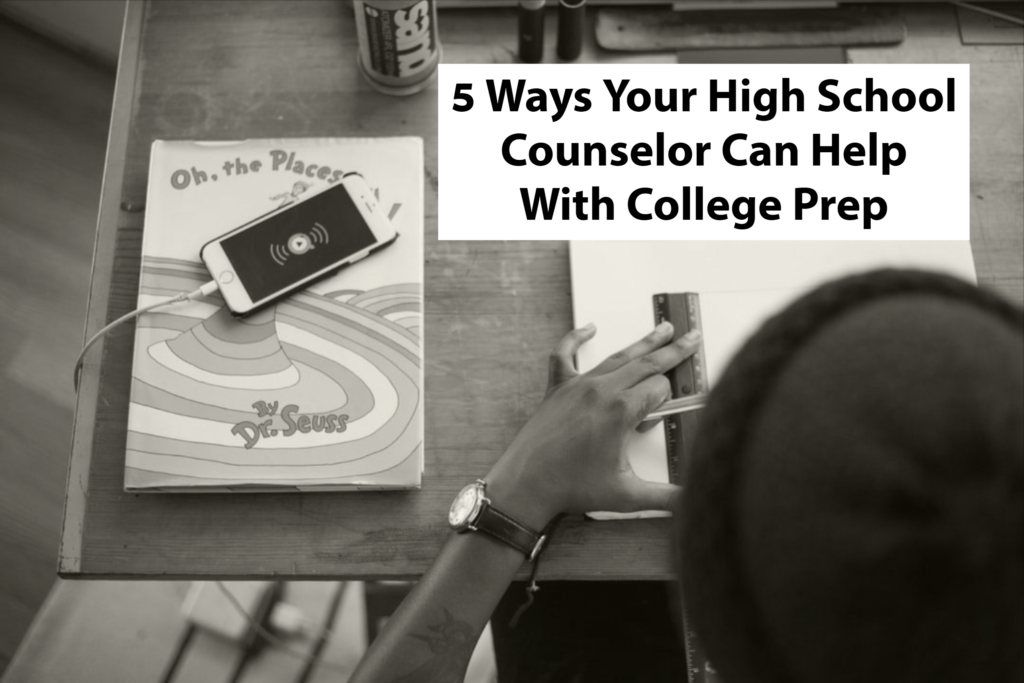
You would be surprised at the amount of material that comes across your high school counselor’s desk: from scholarship opportunities, to college admissions counselor recommendation requests, to leadership positions, to volunteer opportunities. Making friends with your counselor may well be the most important and valuable relationship your teen cultivates during high school.
It’s no surprise to parents that high school counselors are busy. They juggle regular counseling duties, paperwork and college prep. Most have too many students to advise and most are required to spend so much time on paperwork that it’s impossible to speak with every student. Research shows that the average counselor to student ratio is 470-1. All the more reason to cultivate that counselor relationship and ask for help.
High school counselors are eager to help when asked and recognize their value and part in the college prep process. Here are five ways high school counselors can help with college prep:
1. Help with planning high school courses
A school counselor can guide your teen in choosing courses that will challenge them academically and prepare them for college. There is no substitute for a solid academic, college focused education. Your teen’s transcript will be the cornerstone of their college application and college admissions counselors weigh the content of that transcript to determine your teen’s ability to handle a rigorous college course load. A college education builds on the knowledge and skills that your teen has acquired during junior high and high school. Most selective colleges with the highest admission requirements look for students who have taken challenging science and math courses beyond the basics.
If you high schools offers AP (Advanced Placement) courses and exams, the counselor can recommend the courses that colleges look for on a transcript. AP courses are college level courses in approximately 16 different subjects helping students to prepare for college level work while still in high school. After the course is completed, your teen can take an AP test in the subject and many times receive college course credit. There is a difference between Honors classes and AP classes. Honors classes are advanced classes. AP classes and AP Honors classes offer the opportunity for testing once the course is completed. Having these difficult courses on your teen’s transcript communicates that they are up for the challenge of college and they can successfully complete college-level courses.
Many schools also offer an opportunity to take Dual Credit courses. Counselors should be able to provide you with information if this program is available. A dual credit course is a college course taken by a high school student for which the student earns both college and high school credit at the same time. Some courses are taught at the high school campus during high school hours while others are taught at local colleges during the day, evenings, and weekends. By participating in the dual credit program, it enables your teen to make substantial progress toward their college degree before finishing high school. Students who begin taking courses in their junior year can earn thirty or more college credits by the time they graduate from high school if they also take summer classes at the college. It is possible to earn sophomore status even before they start college full time.
2. Recommend colleges
High school counselors stay in contact with colleges and their admissions representatives. They can recommend the colleges that best fit your student’s interests, academic profile and other criteria such as size and location. Helping a student understand his or her academic standing and how it can affect the chance for admission is a key part of the college prep process. Counselors have mounds of literature about colleges and universities that can help your student choose the right route while looking at their interests and career aspirations in the process.
Counselors have information related to college fairs and on-campus meetings with college admissions representatives. These opportunities help students gather the information they need to help make an informed college selection.
3. Put you in touch with volunteer opportunities
Counselors receive information about volunteer opportunities and community service projects. Once the counselor knows your student’s areas of interest, they can put them in touch with the activities that fit those interests. Some high schools even offer academic credit for volunteer work through service learning — a program that offers hands-on learning through service to the community. To find out if your school offers service learning, talk to your school counselor.
Your student’s volunteer work illustrates your interests and character. When you list your volunteer work on your college applications, you show admission officers the value you’ll bring to their campus community. Since volunteer and community service are important aspects of the college application, be informed about these opportunities when they become available by staying in contact with your high school counselor.
4. Provide you with scholarship applications
High school counselors receive scholarship information and applications each year from those companies, organizations, and colleges offering scholarships. They provide information about the PSAT and National Merit Finalist Scholarships as well.
Students should visit their counselor regularly to inquire about any new scholarship applications their counselor has received, especially during senior year. In many cases, the counselors also have information about local scholarships, which can be hard to find online. These scholarships offer the best odds of winning for your student since few apply and the competition for the scholarship is less than widely popular national scholarships.
5. Write recommendation letters
One of a counselor’s most important responsibilities when it comes to college prep is providing a recommendation letter to the colleges. It stands to reason that if your counselor knows your student and has assisted them in college prep, they will be more likely to write a much more knowledgeable and personal recommendation letter.
My daughter and son attended a rather large high school. At the time, being uninformed and unaware, we did not understand the value of this relationship. When senior year came along she missed several scholarship opportunities because the counselor did not even know she was applying to several of the colleges. When recommendation letter time came along the counselor refused to complete her recommendation stating that she did not know my daughter well enough to write a letter for her. My daughter had to explain to several admission committees why she was not able to obtain a counselor recommendation. Spare yourself this complication by cultivating the counselor relationship.
The high school counselor relationship is a key part of the college prep process. They exist to help parents and students work toward their goals after high school—college prep is a key part of the help they provide. Start each year off with a meeting with the school counselor, ask questions, and ask for help with college prep. Utilizing this resource can help parents and students stay informed and equipped throughout the college prep process.


